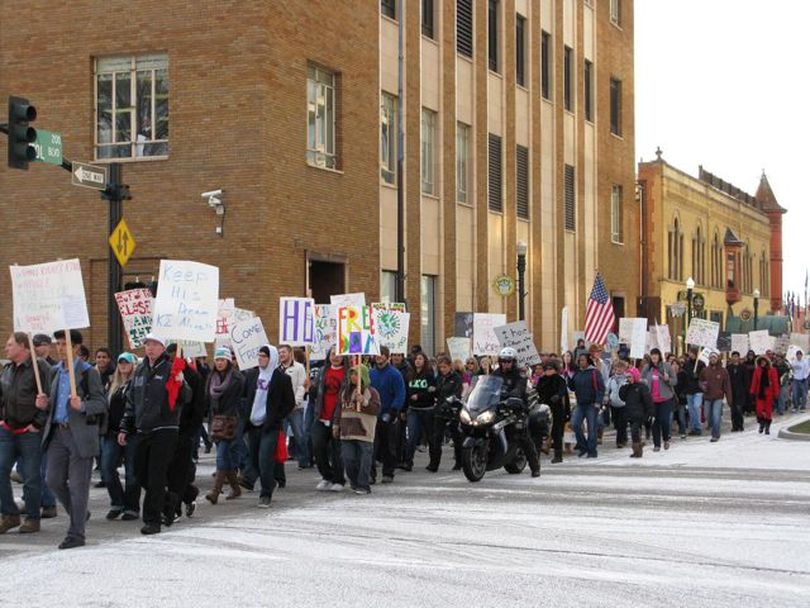Idaho marks MLK Day/Idaho Human Rights Day

"We've made historic strides since Rosa Parks refused to go to the back of the bus," Idaho Gov. Butch Otter declared today at the state's official celebration of Martin Luther King Jr./Idaho Human Rights Day in the state Capitol rotunda. The holiday, he said, is "a time for all Americans to reaffirm their commitment to the basic principles that underly our Constitution: Equal treatment and justice for all," reading from the state's official proclamation declaring the holiday today.
Earlier, hundreds marched from Boise State University down Capitol Boulevard to a rally on the Statehouse steps, chanting, "Two, four, six, eight, Idaho's too great for hate," and carrying signs with slogans including, "Keep his dream alive," "Freedom," and "Add the Words." That's the slogan for a campaign to add sexual orientation and gender identity to Idaho's human rights law, which provides protections against discrimination based on race, religion or disability. Legislation to add the words to the law was introduced last year, but didn't advance. At least 20 states, including Washington, already ban discrimination on the basis of sexual orientation.
Former longtime Idaho Human Rights Commission director Marilyn Shuler gave the keynote address at today's official ceremony in the rotunda, entitled, "Have we gotten there yet?" She noted, "Dr. King was born 83 years ago, the same year as Anne Frank." Both are honored in Idaho today, through the official state holiday, and through the Idaho Anne Frank Human Rights Memorial in Boise, which Shuler noted is "visited every year by countless schoolchildren who come to learn about basic human rights."
Said Shuler, "We have a chance to ask ourselves a simple question: Have we gotten there yet? And a second question: What should I be doing to see that we get there?" She recounted the history of human rights in Idaho, including early low points like the Idaho Legislature banning marriage between caucasians and people of Japanese ancestry, and high points like the creation of the Idaho Human Rights Commission in 1969 to enforce anti-discrimination laws. "It's worth thinking about how far we still have to go," Shuler said. "We know we haven't gotten there." She pointed out that the state still doesn't ban discrimination, including in housing and employment, based on sexual orientation, and noted disadvantages faced by Idaho's largest minority, its Hispanic population. "We still need to do better ... in our state," Shuler said. "Each one of us, every day, has a chance to make a difference."
